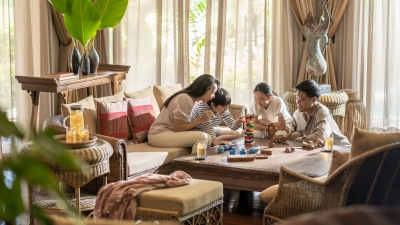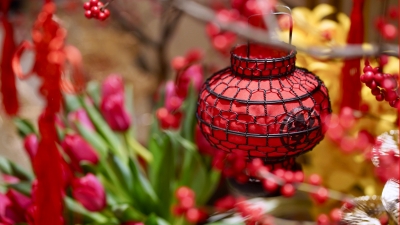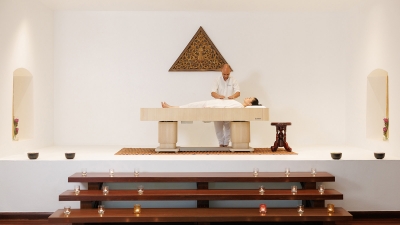Splashy, colourful, and full of fun – Songkran is the most eagerly anticipated celebration in the Thai calendar, every year. A cultural phenomenon that has evolved from a more solemn Hindu/Buddhist observance of the astrological New Year into a weeklong celebration, the festivities bring a true sense of joy among locals and travellers alike. “A tradition common to many Asian communities, Maha Songkran (from the Sanskrit word Sankranti - meaning celestial passage) originated centuries ago, to mark the rising of Aries on the astrological chart, as well as the transition from the heat of summer as the first rains arrive,” remarks Ashok Nair, Director of Rooms and Residences, Four Seasons Resort Chiang Mai.
In modern times, the ritualistic significance of Songkran has receded, if only due to the extravagance with which the water element has been elevated into a summertime, carnival-like splash-about. Marked clearly now as April 13 every year, Maha Songkran is now the focal point of a week-long celebration prescribed by the Thai Royal Court and the Government. While no longer recognised as the Thai New Year, traditional practices alluding to it have been retained in most Thai Buddhist households, where the day begins with merit-making and the offering of food to Buddhist monks at the local temples.
Water has always been central to this theme as a result, as temples and houses were washed, and a renewal was suggested by the ritual sprinkling of scented water. The sprinkling of water resonates deeply within the festival's socio-cultural aspect. Water is a precious resource in the region and believed to be a primary life-giving element in Thai culture, as it relates to start of the rice-growing cycle, which commences with the rains. Buddhist idols and shrines are meticulously washed, and even homes go through a thorough spring cleaning to suggest a rinsing of impurities and to mark a fresh start to the year.
Coinciding with what is usually the hottest time of the year in Thailand and its neighbouring countries, the sprinkling of water has in recent times become the theme for a grand summer holiday with friends and family. Crowds of revellers gather along central avenues in Thailand’s towns and villages to join in the fun as the youngsters' splash water on each other with gusto. Major streets are closed to traffic and parades to crown a Lady Songkran or Miss Songkran are popular during the weeklong celebrations.
One unique aspect of traditional Songkran observance in Thailand and Myanmar is the practice of erecting sand stupas to accrue merit and blessings in the Buddhist tradition.
Songkran with Four Seasons Chiang Mai
As a custodian of the spirit of the region, Four Seasons Chiang Mai joins in the celebration with a range of experiences that provide a glimpse into the culture and heritage of the festivities.
- Water sprinkle fun: A cherished custom where youngsters sprinkle water over the hands and feet of their elders in return for blessings, guests are encouraged to participate in this soulful and deeply gratifying activity that lies at the heart of Songkran traditions.
- Cultural workshops: Typical of this region, the Lanna “tung” flag is especially venerated during Songkran as it symbolises prosperity and good luck for the new year. “Guests can learn to craft their own flag with the help of skilled local artisans and also engage in other family-friendly activities together at Chaan Baan,” suggests Nair.
- Gastronomic delights : Songkran is a time for togetherness, and the interactive cooking class at Rim Tai Kitchen is a fabulous way to explore the culinary delights of Songkran with the family. “Our menu at Khao by Four Seasons represents a culinary journey across Thailand with signature Northern Thai dishes offering a true flavour of the region,” he adds.
- Spa retreats: Harnessing the goodness of locally grown roses, the exquisite Rose of the North ritual at the Wara Cheewa Spa is a true reflection of the fine aspects of the celebration. “Guests can embark on a journey of renewal and relaxation with this signature ritual,” recommends Nair.
Celebrate in Chiang Mai
“Venture beyond the Resort to explore the vibrant local markets and ancient temples that dot the landscape of Chiang Mai,” he suggests. “Join in lively street processions and merit-making ceremonies held throughout the city, gaining a cultural insight into the deep-rooted traditions of Songkran.” Nair and the concierge team suggest these places to soak in the festive atmosphere in Chiang Mai:
- Tha Phae Gate: This gathering at the large courtyard near Tha Phae Gate is not for the faint of heart. "Come prepared to be soaked head-to-toe, and bring your own water guns to join in the fun,” grins Nair. Besides the thrill of water-splashing, guests may witness the Songkran Beauty Contest, Lanna Tung Making displays, and even traditional Khantoke Lanna dinner scenes.
- Chiang Mai Moat: Close to Tha Phae Gate, the Chiang Mai moat is another popular spot to engage in water bouts during Songkran. Beautiful decorations and lighting add grandeur to both sides of the canal as therevellers party late into the night here.
- Nimmanhaemin Road: This lively stretch of modern cafes and boutique restaurants is as popular with the locals as it is with the tourists who visit here during Songkran.
- Temples in Chiang Mai: Songkran in Chiang Mai is not all about water fights though. The city is home to more than a hundred Buddhist temples, with some dating back to medieval times. Guests looking for a more sombre experience of Songkran may visit some of the more auspicious sites where merit-making and monk interactions may be observed. “Wat Phra Singh, located in the heart of the old city, is known as the site of enshrinement for Phra Phutta Sihing - an important mendicant of the region. The temple hosts a procession of Buddhist images to mark Songkran on April 13 every year,” says Nair. Another site worth visiting is Wat Jed Lin, the largest “sand pagoda” in Chiang Mai built to stand eight metres (26 feet) tall with five tiers built out of 700 cubic metres (24,700 cubic feet) of sand.
- Night Markets: From delicious street food and handicrafts to lively performances and cultural shows, visiting Chiang Mai’s vibrant night markets during Songkran is an absolute must. “City hotspots such as the Sunday Night Market at Tha Phae Gate, the Wua Lai Night Market, and the Night Bazaar will be all lit up and buzzing well into the night,” he recommends.
Prepare for the Celebration
Guests attending the events are recommended to dress in light, quick-drying fabrics. “Locals tend to prefer the brightly coloured, floral ‘Songkran shirts’ when out celebrating. Pick up your outfit from the stalls selling this and other Songkran costumes!” says Nair. Anti-skid shoes or rubber flip-flops are recommended and as a note of caution, “Be careful not to splash water on monks, pregnant women, babies and the elderly.”
Experience Songkran in Chiang Mai, Thailand with Four Seasons Resort Chiang Mai call +66 (0)2 207 8900 email reservations.thailand@fourseasons.com, or chat with us via the FS Chat App.
















